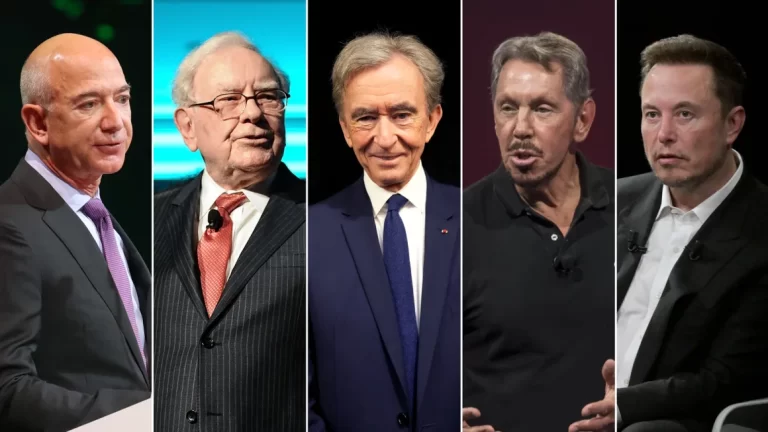The five wealthiest people on Earth have become a whole lot richer in recent years.
Since 2020, these billionaires’ net worth has skyrocketed 114% to a total of $869 billion, after taking inflation into account, according to Oxfam’s annual inequality report, released Sunday. If current trends continue, the world could see its first trillionaire in a decade.
At the same time, nearly 5 billion people globally have become poorer, as they contend with inflation, war and the climate crisis. It would take nearly 230 years to eliminate poverty based on the current trajectory.
The report, which draws on data compiled by Forbes, is timed to coincide with the kickoff of the annual World Economic Forum meeting in Davos, Switzerland, an elite gathering of some of the wealthiest people and world leaders.
Though inequality is on the rise, there are some bright spots, said Nabil Ahmed, Oxfam America’s director of economic and racial justice. Workers have been flexing their muscle through strikes and deals that better their compensation and working conditions. Also, some governments have been on their side, pushing policies aimed at strengthening workers’ rights.
“We find ourselves in a new Gilded Age, but workers, regulators and union and community organizers are starting to make cracks in it,” Ahmed said.
Rising fortunes
Elon Musk, who runs several companies, including Tesla and SpaceX, was the big winner in recent years. His wealth soared to $245.5 billion at the end of November, up 737% from March 2020, after accounting for inflation.
Bernard Arnault, chairman of French luxury goods giant LVMH, and his family had a net worth of $191.3 billion, up 111%. Amazon founder Jeff Bezos had a fortune of $167.4 billion, up 24%; while Oracle founder Larry Ellison’s wealth totaled $145.5 billion, up 107%.
Rounding out the list of top five wealthiest people was Berkshire Hathaway CEO Warren Buffett, whose net worth rose 48% to $119.2 billion. Overall, billionaires have seen their wealth grow by $3.3 trillion, or 34%, since 2020, with their fortunes expanding three times faster than the rate of inflation, according to Oxfam.
US billionaires, many of whom derive their wealth from the equity in the companies they lead, are $1.6 trillion richer.
Corporate power
In this year’s report, Oxfam argues that businesses are raking in big profits, which are helping fuel the fortunes of the wealthy. Seven out of 10 of the world’s largest public companies have either a billionaire CEO or a billionaire as its principal shareholder.
What’s more, the top 1% holds 43% of the world’s financial assets, according to Oxfam, drawing on data from Wealth X. In the United States, this group owns 32%; in Asia, it’s 50%. In the Middle East, the top 1% holds 48% of the financial wealth, while in Europe, it’s 47%.
Some 148 of the world’s largest corporations made nearly $1.8 trillion in profits in the 12 months leading up to June 2023, Oxfam said. That’s 52.5% higher than their average was between 2018 to 2021. Oxfam calls out the oil and gas industry, pharmaceutical companies and the financial industry for reaping higher profits in the last year or two than their average in prior years.
“We ignore at our peril the role of monopoly power in redistributing wealth to the top,” Ahmed said.
Oxfam is calling on governments to step in.
“Public power can rein in runaway corporate power and inequality — shaping the market to be fairer and free from billionaire control,” Amitabh Behar, Oxfam International’s interim executive director, said in a statement. “Governments must intervene to break up monopolies, empower workers, tax these massive corporate profits and, crucially, invest in a new era of public goods and services.”
— CutC by bbc.com


